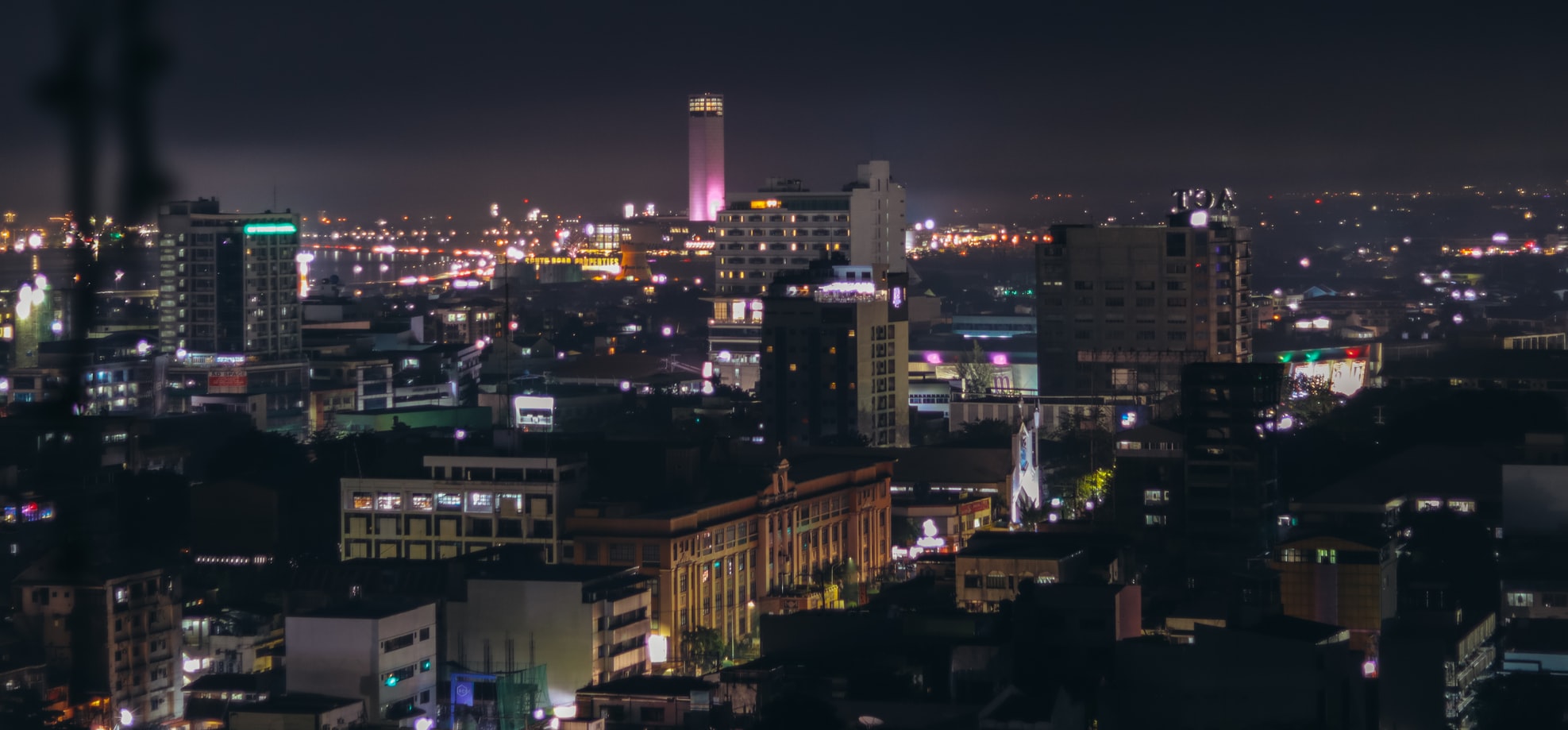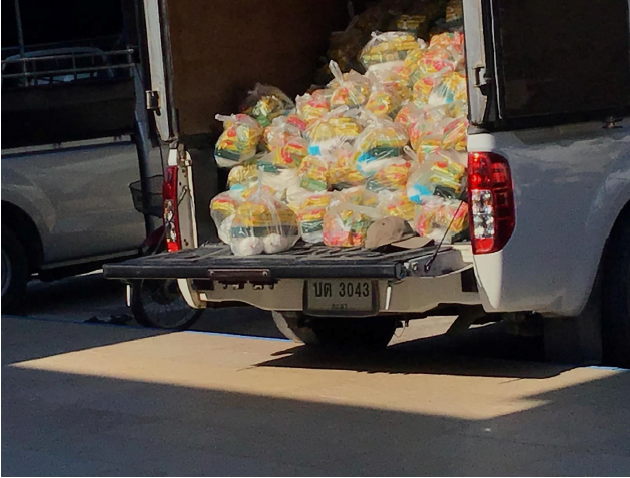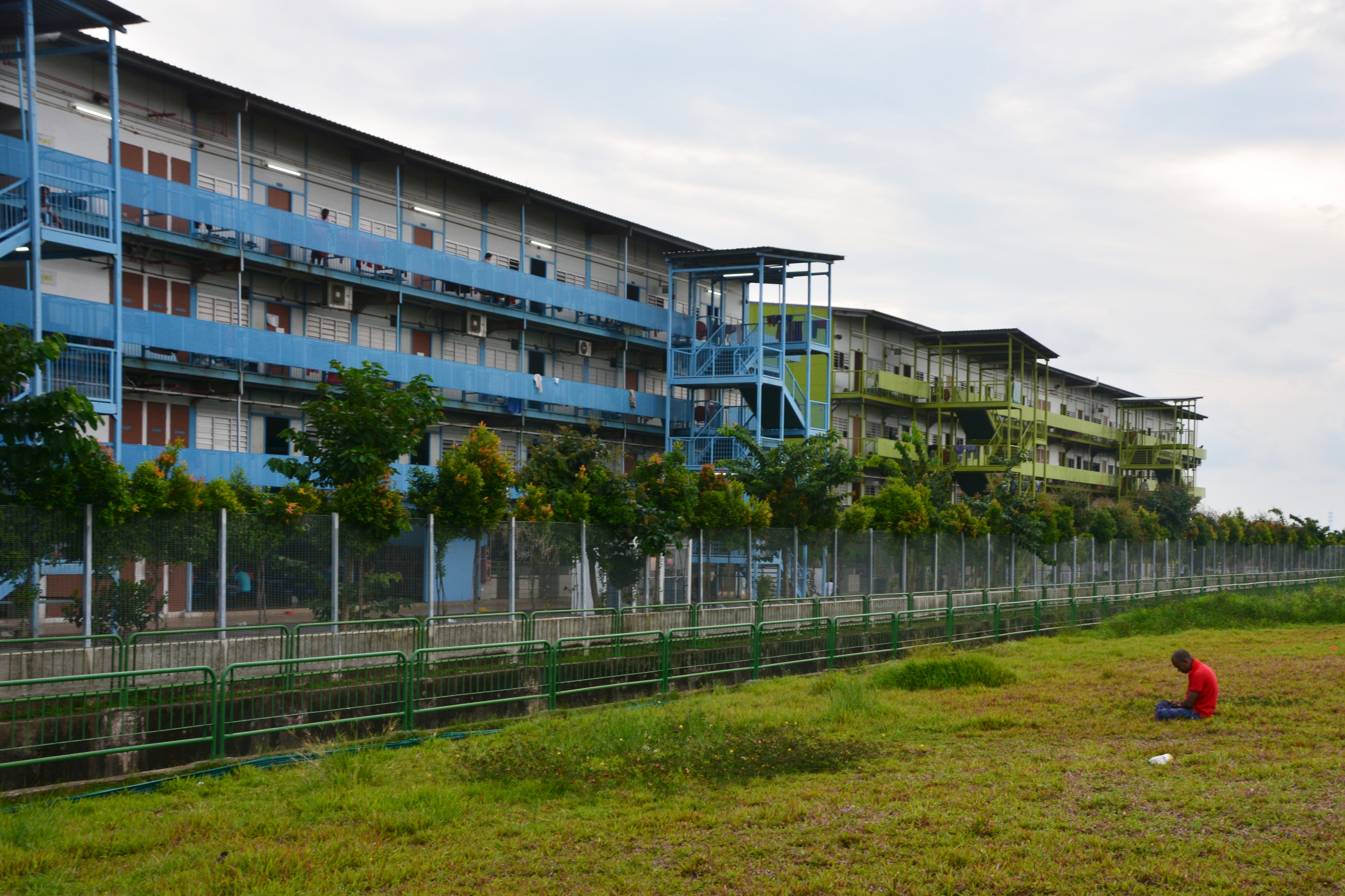“The campaign ‘happiness-sharing pantries’, by the local community throughout all the provinces in Thailand, has been very successful and huge social impacts have been drawn from the campaign which expose common problems of economic and social disparity and social welfare structures,” writes Thanapat Chatinakrob, a PhD researcher at the University of Manchester International Law Centre in Manchester
_______________________________________________
During the severe COVID-19 pandemic, it is almost impossible for the government to help and treat its nationals at all levels. The campaign ‘happiness-sharing pantries’ has been introduced by the local community throughout all provinces in Thailand with an aim to ease hunger for needy during the pandemic. This campaign is very successful in Thailand because of several factors, such as type of a pantry, its location, its shared ownership, legalisation, the involvement of authorities, and religious belief. There are also huge social impacts drawn from the campaign which expose common problems of economic and social disparity and social welfare structures.
The spread of the COVID-19 pandemic has taken lives, affected the well-being of people, and hit the global economic system. Countries try their best to come up with remedial measures to help their people. Some are successful, but some are not. According to a report presented by the World Health Organization South-East Asia Region Office (WHO SEARO), approximately 24 million cases have been reported to the WHO globally with 4 million of them within the South-East Asia Region (WHO SEARO, 2020). There are currently ten South-East Asia countries with cases, including Thailand (data as the end of August 2020) (WHO SEARO, 2020).
The COVID-19 pandemic has directly affected the Thai economy and its growth projection as Thailand is one among early countries with cases (WHO, 2020a). The Thai economy, which relies on global trade, has been hit by at least 5 per cent in 2020 (World Bank, 2020a: 4; Thaicharoen, 2020; Deloitte, 2020: 16-25; USDA, 2020: 2-6). The service sector has also faced a sharp decline in tourism and related sectors, such as transportation, accommodation, and food service activities since March 2020. It accounts for approximately 15 per cent of GDP (World Bank, 2020b: 8-11). Household welfare is likely to be more severe. The living below USD 5.5 per day is double from 4.7 million in the first quarter of 2020 to estimate 9.7 million in the second quarter of 2020 (World Bank, 2020b: 26-28; Mazars, 2020: 1-20). The Thai government has come up with strategic preparedness and response plans (WHO, 2020b: 1-3; Department of Disease Control of Thailand, 2020; German-Thai Chamber of Commerce, 2020) to tackle the pandemic and make compensation for its people, but they are never adequate. Fortunately, there are several community-based initiatives as a bottom-up approach in challenging this pandemic by non-authorities. Here is a part of the stories in Thailand, which focus on a particular campaign called ‘Happiness-sharing Pantries’.
What is the ‘happiness-sharing pantries’ campaign?
The ‘happiness-sharing pantries’ campaign has been introduced by the local community in Bangkok, Thailand (Little Brick group, 2020a; Thai News Service Group, 2020a). The idea simple. It begins with the idea that people in a community would like to share food, daily necessities, or even medicines with those who need them. The pantries used in this campaign are based on the common pantry or cupboard that almost every house in Thailand already has. The work of happiness-sharing pantries is straightforward. It is suggested that people who get food will feel happy and people who donate them will also feel the same (Thai News Service Group, 2020a).
Figure 1: Samples of ‘happiness-sharing pantries’ located at different places in Thailand (Little Brick group, 2020a)
It initially started from only five model pantries located in different places in Bangkok, Thailand. This campaign aims to alleviate the negative economic effect from the spread of COVID-19 pandemic. At first, people believed that this campaign would not work as the social structure of Thailand differs from other countries (Little Brick group, 2020a). There was a survey conducted by the Little Brick group showing that no one would put free food in the pantries (Little Brick group, 2020a). However, two weeks after the beginning of the campaign, the pantries were still there and thus received huge attention (Thai News Service Group, 2020a). The pantries were accepted and increased number throughout Thailand. Government sectors have positively responded to the campaign and set additional cupboards at the entrance of their offices (Thai News Service Group, 2020a; Thai News Service Group, 2020b). Temples, police stations, military camps, hospitals, local markets, and some supermarkets have also joined the campaign (Thai News Service Group, 2020a). As of the end of August 2020, every province in Thailand has access to the pantries, with more than 300 official pantries in Bangkok, more than 100 official pantries in Phuket, and more than 50 official pantries in Chonburi (Pattaya). The total number of official pantries reached more than 1,400 in Thailand (Little Brick group, 2020a).
Figure 2: This map shows the approximate number of ‘happiness-sharing pantries’
in each province of Thailand (Little Brick group, 2020b).
Why does this campaign work in Thailand?
To consider reasons why the ‘happiness-sharing pantries’ campaign works in Thailand, at least three key players contribute to this campaign: the charity, local communities, and the government.
No official source confirms where the ‘Happiness-sharing Pantries’ campaign originated, but one of the most promising possibilities is the group of 20 people named ‘Happiness-sharing Pantries by the Little Brick group’ that the group is inspired by ‘Little Free Pantry’ by Jessica McClard from Fayetteville, the USA (Little Brick group, 2020a; Little Free Pantry, 2016). The Little Brick group first installed five model pantries in different places in Bangkok and found that the type of pantry and the location are crucial (Little Brick group, 2020c). Even though the type and characteristic of a pantry have no formal standard, it should resist the heat and the rain. If possible, it should have a cover to prevent bugs or other animals (Little Brick group, 2020c). There should also be a sign specifying the objectives of the pantry (Little Brick group, 2020c). The location of a pantry should be noticeable at accessible locations near markets, public transportation stops government service offices or any reachable places in a community.
The campaign is genuinely a local and bottom-up initiative. At the very first stage, the campaign was initiated by local communities; no government sector contributed to the campaign. Every pantry national-wide was a locally-based initiative. Local communities maintain this campaign by promoting a sense of shared ownership (Little Brick group, 2020c). Even though a pantry belongs to a person in a community or there is a person who installs a pantry, the community tries to build the consensus that everyone is the owner of a pantry, thus promoting a feeling of shared ownership (Little Brick group, 2020c; Thai News Service Group, 2020a). A feeling of shared ownership in a community should involve the participation of local communities and the making of decisions in every stage of the process, outcome, and distribution (Bowen, 2005: 78-86; Lachapelle, 2008: 53-55; Clay Street Table, 2012). The feeling of shared ownership of the happiness-sharing pantries in Thailand’s local communities is promoted in the same way (Gingerella, 20020; Thai News Service Group, 2020a); it is embedded in the existing tradition of community activities that people have engagement in filling food, taking care of it, and taking it out in an appropriate proportion.
However, to set any instalment at the roadside in Thailand needs official permission from the local authorities. Any pantry-donator shall ask for permission from the local authority to prevent from violation of laws, especially Section 39 of the Act on the Maintenance of the Cleanliness and Orderliness of the Country, B.E. 2535. The request for permission is a mandatory requirement under such Act in Thailand for any actions that may affect the public place to secure a happiness-sharing pantry. By submitting such requests, it draws the attention of local authorities, especially police officers. They recognise the existence of the pantries and also support the regularity and orderliness of the pantries (Thai News Service Group, 2020a; Thai News Service Group, 2020b). For example, many central administration offices, such as the Ministry of Culture, the Department of Rural Roads and provincial administration offices, such as the provincial governor of Phra Nakhon Si Ayutthaya and his team, Chiang Mai Administration, Chachoengsao City Municipality, and Phetchabun Local Administrative Office, have joined the campaign by installing the pantries in their areas.
After the Centre for COVID-19 Situation Administration of Thailand (CCSA) announced the easing of Phase 5 restrictions plan from the 1st July 2020 (National News Bureau of Thailand, 2020), most of the business operations have been reopened. The importance of pantry scheme seems to be deprioritised. People rarely donate foods and some pantries are abandoned. However, a civil society organisation named ‘PunSook Society (Happiness-sharing society)’ is formed to coordinate and sustain the campaign (PunSook Society, 2020). This permanent organisation is also supported by many government and non-government sectors, including the Digital Economy Promotion Agency, the Federation of Thai Industries, the State Railway of Thailand, the Transport Co., Ltd, and the Board of Trade of Thailand (PunSook Society, 2020). Therefore, the PunSook Society acts as an agent between donators and the needy in the post-COVID-19 era.
Social impacts
Whether there is COVID-19 outbreak or not, the existence of happiness-sharing pantries for distribution of foods to the needy might decrease the economic and social disparity in a Thai community. The pantries require neither minimum nor maximum donation because the idea of pantries only comes from sharing a small portion of food or leftovers in the kitchen of any household which can be shared to others (Little Brick group, 2020a; Little Brick group, 2020c).
Several scholars have realised that the introduction of the pantries sharing programme exposes the problems of the social welfare structure and social protection system that that, in the Thai context aims at getting people to take responsibility for themselves(Nattaya, 2020; Ariyapruchya, Nair, Yang & Edmund, 2020; TDRI, 2020). The Thai government cannot effectively support all nationals, but can only involve itself with some small parts. This idea seems to directly cause a problem of scrambling for free food as the needy might be unsure whether they will receive the same amount of foods in coming days. In other words, the social welfare system does not ensure and support enough people for their well-being. Vulnerable groups, including the poor, migrants, older people are not sufficiently protected (Ariyapruchya, Nair, Yang & Edmund, 2020). It leads to a lack of stability in life and causes the needy to take food and stuff as much as possible.
The participation of the governmental authorities in the ‘happiness-sharing pantries’ campaign seems to be a positive approach done by the government, but it actually might not be true in some aspects. Even though the government supports them, such as surveilling the orderliness of pantries (Post Reporters, 2020; Wattanasukchai, 2020), which helps their management to be orderly and smooth, this creates a new problem for community learning. People who take a small portion of foods from the pantries do so because of fear. The government should involve itself in this campaign only by promoting it. The surveillance should be done by the local community and this will prolong the campaign sustainably. In the case that the government wants to join the campaign by leaving food in the pantries, it is better for them to directly donate foodstuffs to the people as the government has potential to do so; there is no need to put foods in the pantries.
Besides, at an international level, the community-based campaign ‘happiness-sharing pantries’ initially seems to conform to the Sustainable Development Goals (SDG), especially Goal 2: Zero Hunger as proposed by the United Nations (UN, 2015). As the food is one of four basic needs that every person need it every day. The ease of hunger from the available foods at the pantries will help the needy at least in local communities.
References
Act on the Maintenance of the Cleanliness and Orderliness of the Country, B.E. 2535 (1992).
Ariyapruchya, K.; Nair, A.; Yang, J.; and Edmund, H. (2020) ‘The Thai economy: COVID-19, poverty, and social protection’, World Bank blog, 28 April [online]. Available at: https://blogs.worldbank.org/eastasiapacific/thai-economy-covid-19-poverty-and-social-protection (Accessed: 2 September 2020).
Ayutthaya. (2020) ‘Provincial governor of Phra Nakhon Si Ayutthaya sets the panty of sharing at the town hall’, Ayutthaya, 13 May [online, in Thai]. Available at: https://ww2.ayutthaya.go.th/news/detail/8114 (Accessed: 1 September 2020).
Bowen, G.A. (2005) ‘Local-Level Stakeholder Collaboration: A Substantive Theory of Community-Driven Development’, Journal of the Community Development Society 36(2), pp. 73-88.
Chachoengsao administration office. (2020) ‘Chachoengsao City Municipality to set a pantry of sharing’, Chachoengsao administration office, 14 May [online, in Thai]. Available at: http://www.chachoengsao.go.th/cco/index.php/2016-02-15-05-52-57/2016-04-24-08-45-44/3495-2020-05-14-06-39-20 (Accessed: 1 September 2020).
Clay Street Table. (2011) Food Pantry [online]. Available at: https://claystreettable.org/food-pantry/ (Accessed: 1 September 2020).
Crawshaw, M and Bijoux, D. (2012) Good Cents Community Pantry: Growing skills, social connections and food [online]. Available at: https://inspiringcommunities.org.nz/wp-content/uploads/2014/09/good_cents_community_pantry_growing_skills_social_connections_and_food.pdf (Accessed: 1 September 2020).
Deloitte. (2020) Respond, Recover, Thrive: An evolving perspective on the economic impacts of COVID-19: A view from Thailand – August 2020 [online]. Available at: https://www2.deloitte.com/th/en/pages/about-deloitte/articles/thailand-economic-outlook.html (Accessed: 27 August 2020).
Department of Disease Control, Ministry of Health, Thailand. (2020) Corona Virus Disease (COVID-19): Thailand Situation [online]. Available at: https://ddc.moph.go.th/viralpneumonia/eng/index.php (Accessed: 27 August 2020).
Department of Rural Roads. (2020) ‘DDR sets a pantry of sharing to help the needy among the COVID-19’, Department of Rural Roads [online, in Thai]. Available at: https://drr.go.th/?p=17092 (Accessed: 1 September 2020).
German-Thai Chamber of Commerce. (2020) COVID-19 Update [online]. Available at: https://thailand.ahk.de/en/translate-to-english-covid-19 (Accessed: 27 August 2020).
Gingerella, B. (2020) Building the food pantry of the future [online]. Available at: https://www.foodservicedirector.com/operations/building-food-pantry-future (Accessed: 1 September 2020).
Lachapelle, P. (2008) ‘A Sense of Ownership in Community Development: Understanding the Potential for Participation in Community Planning Efforts’, Journal of the Community Development Society 39(2), pp. 52-59.
Little Free Pantry. (2020) Who we are [online]. Available at: https://www.littlefreepantry.org/what-we-do (Accessed: 31 August 2020).
Manager Online. (2020) ‘Thai Ministry of Culture to set the pantry of sharing for the needy during COVID-19’, Manager Online, 28 May [online, in Thai]. Available at: https://mgronline.com/qol/detail/9630000055581 (Accessed: 1 September 2020).
Mazars. (2020) COVID-19 – Business Impact Update [online]. Available at: https://www.mazars.co.th/content/download/1002083/52324646/version//file/COVID-19_Business%20Impact%20Update_240720.pdf (Accessed: 27 August 2020).
National News Bureau of Thailand. (2020) ‘Thailand finalizes Phase 5 restrictions easing plan’, Thailand Business News, 29 June [online]. Available at: https://www.thailand-business-news.com/national/79771-thailand-finalizes-phase-5-restrictions-easing-plan.html (Accessed: 2 September 2020).
Nattaya, L. (2020) ‘Pantries of sharing and Thai social welfares’, Sanook, 20 May [online, in Thai]. Available at: https://www.sanook.com/news/8158122/ (Accessed: 2 September 2020).
Phetchabun Local Administrative Office. (2020) ‘Official Letter of Phetchabun Local Administrative Office no. 0023.1/vor 339 stating the pantry of sharing for the needy in the local community’, Phetchabun Local Administrative Office [online, in Thai]. Available at: http://phetchabunlocal.go.th/order/detail/1928 (Accessed: 1 September 2020).
Post Reporters. (2020) ‘Prayut lashes out at pantry raiders for abusing goodwill’, Bangkok Post, 13 May [online]. Available at: https://www.bangkokpost.com/thailand/general/1916896/prayut-lashes-out-at-pantry-raiders-for-abusing-goodwill (Accessed: 2 September 2020).
PunSook Society. (2020) Punsook Society [online]. Available at: http://www.punsooksociety.com/ (Accessed: 2 September 2020).
Radio Thailand (Chiang Mai). (2020) ‘Chiang Mai Administration sets a pantry of sharing for the needy’, Public Relations Office District 3 Chiang Mai, 15 May [online, in Thai]. Available at: https://region3.prd.go.th/topic/news/8981 (Accessed: 1 September 2020).
Thai News Service Group. (2020b) ‘Thailand: SEC sets up pantries of sharing to provide basic necessities for nearby communities’, Asia News Monitor, 21 May [online]. Available at: https://www-proquest-com.manchester.idm.oclc.org/docview/2404649760?accountid=12253 (Accessed: 31 August 2020).
Thai News Service Group. (2020a) ‘Thailand: Pantry of Sharing campaign unlocks Thais’ spirit of generosity’, Asia News Monitor, 13 May [online]. Available at: https://www.proquest.com/docview/2401334296?accountid=12253 (Accessed: 31 August 2020).
Thaicharoen, Y. (2020) ‘Thailand after Covid-19 Prepare to get through the economist’s perspective. Part 1: The impact of the economy and the Thai labor market’, SCB Economic Intelligence Center (EIC), 7 May. Available at: https://www.scb.co.th/en/personal-banking/stories/business-maker/thailand-after-covid-ep1.html (Accessed: 27 August 2020).
Thailand Development Research Institute (TDRI). (2020) ‘Government must mobilize resources to solve the COVID-19’, TDRI Insight, 18 April [online]. Available at: https://tdri.or.th/en/2020/04/government-must-mobilize-resources-to-solve-the-covid-19/ (Accessed: 2 September 2020).
The Little Brick group. (2020a) Facebook page [online]. Available at: https://www.facebook.com/TooPanSukOfficialPage/ (Accessed: 28 August 2020).
The Little Brick group. (2020b) The pantry of Sharing Map [online, in Thai]. Available at: https://www.facebook.com/109439004097332/posts/117934116581154/ (Accessed 31 August 2020).
The Little Brick group. (2020c) Background and objectives of the happiness-sharing pantries campaign [online, in Thai]. Available at: https://www.facebook.com/TooPanSukOfficialPage/posts/120932859614613/ (Accessed 31 August 2020).
United Nations. (2015) ‘Goal 2: Zero Hunger’, United Nations (UN) [online]. Available at: https://www.un.org/sustainabledevelopment/hunger/ (Accessed 2 September 2020).
United States Department of Agriculture (USDA), Foreign Agriculture Service. (2020) The COVID-19 Impact on the Thai Economy [online]. Available at: https://apps.fas.usda.gov/newgainapi/api/Report/DownloadReportByFileName?fileName=The%20COVID-19%20Impact%20on%20the%20Thai%20Economy_Bangkok_Thailand_05-21-2020 (Accessed: 27 August 2020).
Wattanasukchai, S. (2020) ‘Pantries of sharing mustn’t let dark side win’, Bangkok Post, 13 May [online]. Available at: https://www.bangkokpost.com/opinion/opinion/1917012/pantries-of-sharing-mustnt-let-dark-side-win (Accessed: 2 September 2020).
World Bank. (2020a) Global Economic Prospects: June 2020 [online]. Available at: https://openknowledge.worldbank.org/bitstream/handle/10986/33748/9781464815539.pdf (Accessed: 27 August 2020).
World Health Organization. (2020b) COVID-19 Strategic Preparedness and Response Plan: Country Preparedness and Response Status for COVID-19 (as of 9 June 2020) [online]. Available at: https://www.who.int/docs/default-source/coronaviruse/covid-19-sprp-country-status-9june2020.pdf (Accessed: 27 August 2020).
*The views expressed in the blog are those of the authors alone. They do not reflect the position of the Saw Swee Hock Southeast Asia Centre, nor that of the London School of Economics and Political Science.








6 Comments